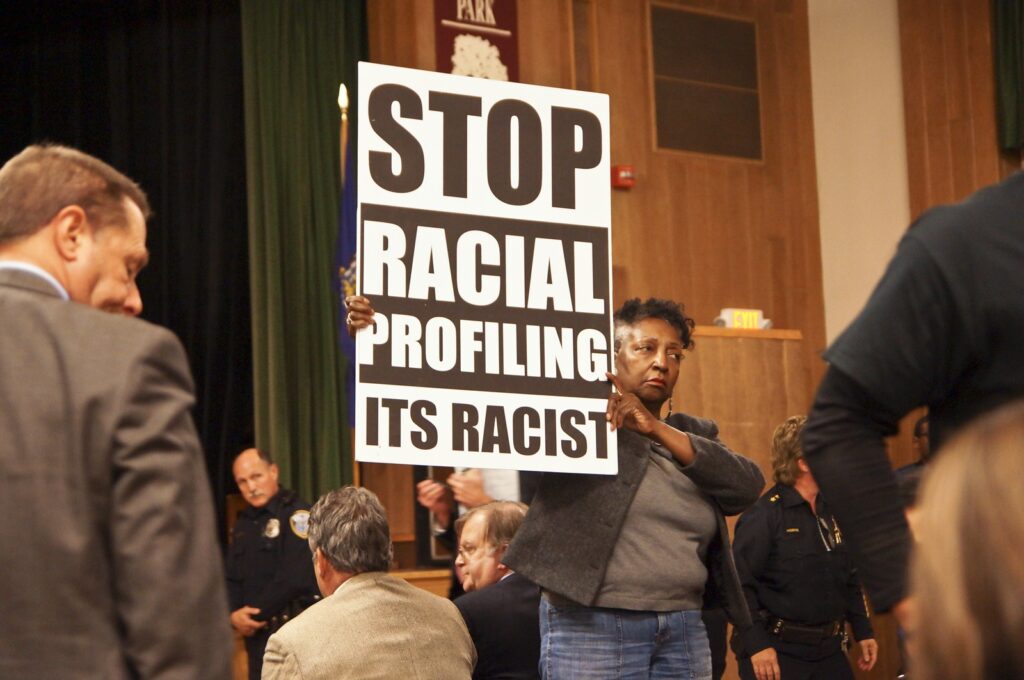
Tasks of writing an essay about racial profiling are very common, and this shows how rampant the matter is. Despite human activists’ efforts to advocate for human equity, incidences of people being discriminated against due to their race still remain high. Internationally, racial profiling is prevalent, especially in nations such as US, UK, and Canada. Fortunately, many significant initiatives have been enacted to try to address this phenomenon.
Racial profiling essay introduction
Racial Profiling is a discriminatory act done by law enforcers on an alleged criminal based on their race, ethnicity, religion, or national origin. A law enforcer is any law enforcement agent acting in a policing capacity for public or private purposes. Therefore, persons such as airport security agents and premises security guards can be guilty of racial profiling. Although racial profiling is often used in place of criminal profiling, these terms are different. Criminal profiling is based on information about suspected activity by someone who meets the description of a specific individual. On the other hand, racial profiling is a result of stereotypical assumptions because of a person’s race, ethnicity, or religion. Racial profiling is an intense concern that mainly affects individuals from minority communities. Racialized persons suffer the most when law enforcers act on their stereotypical views.
Examples of racial profiling
- Pulling over a driver for a traffic stop because of their race or ethnicity, without any other evidence of a traffic violation.
- Stopping and searching a pedestrian based on their race or ethnicity rather than any suspicious behavior or evidence of criminal activity.
- Using racial or ethnic appearance as a factor in deciding who to subject to extra security screenings at airports or other public transportation hubs.
- Assuming that a person of a certain race or ethnicity is involved in criminal activity based on their clothing, hairstyle, or location.
- Detaining individuals based on their race or ethnicity during immigration enforcement raids.
- Profiling African Americans as gang members based on their neighborhood, clothing, or the people they associate with.
- Assuming that people of Middle Eastern descent are likely to be terrorists.
- Profiling Hispanic individuals as undocumented immigrants based solely on their accent or appearance.
- Assuming that people of Asian descent are more likely to be involved in drug trafficking.
- Targeting Indigenous people for increased police surveillance or enforcement in certain neighborhoods or communities.
When did racial profiling begin
The origins of racial profiling can be traced back to slavery and the systemic racism that followed the abolition of slavery in the United States. However, the use of racial profiling as a law enforcement tactic has a more recent history.
Racial profiling became a more widespread practice in the United States during the 1980s and 1990s, as law enforcement agencies began to focus on drug enforcement and immigration control. The “War on Drugs” and “Zero Tolerance” policing policies of this time period led to an increase in racial profiling, as law enforcement targeted communities of color for drug offenses and immigration violations.
War on Drugs sought to combat illegal drug use by greatly increasing penalties, enforcement, and incarceration for drug offenders. Unfortunately, youthful African Americans seemed to be most affected because they were the most involved individuals (due to a lack of access to quality education and job opportunities).
Racial profiling has continued to be a problem in the United States and around the world, with numerous instances of racial profiling being documented and reported in the media. Despite efforts to address and combat racial profiling, it remains a persistent issue in many communities, particularly for people of color and other marginalized groups.
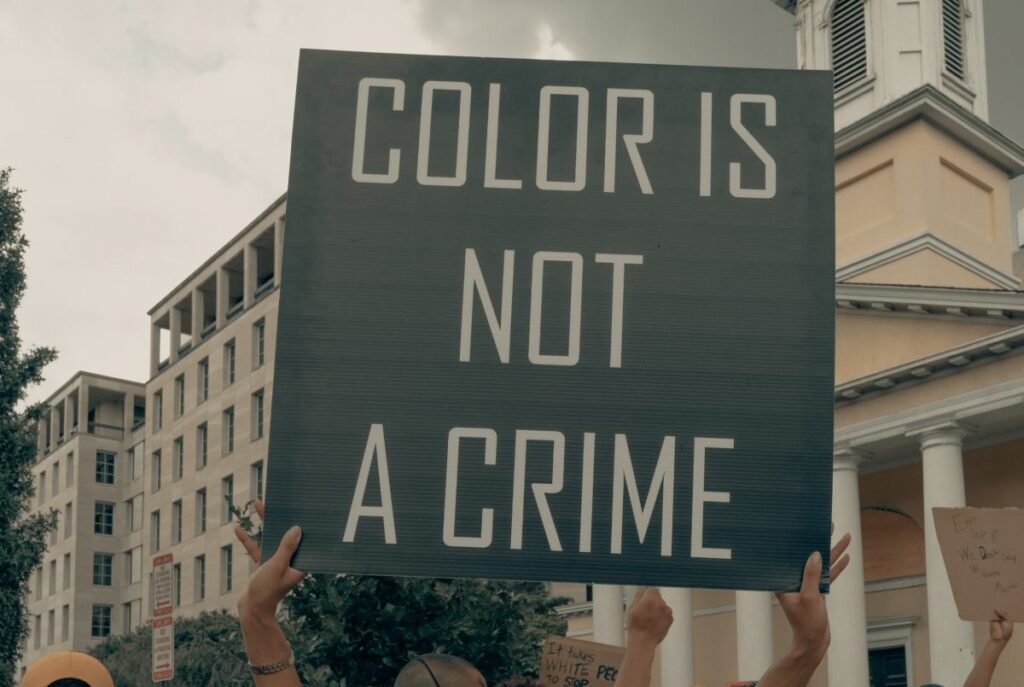
How often does racial profiling happen
It is difficult to quantify exactly how often racial profiling occurs, as it is often underreported and may not be captured by official statistics. However, studies and reports have indicated that racial profiling is a widespread problem that affects individuals of color and other marginalized groups on a regular basis.
Based on the article, ‘Driving While Black: Racial Profiling on our Nation’s Highways’ by Davis Harris, African Americans, and Latinos are disproportionately targeted by police during traffic stops, despite the fact that they are no more likely than other racial groups to engage in criminal behavior. In addition, research has shown that people of color are more likely to be stopped and searched by law enforcement, even when they are not committing a crime.
Social media has also helped show the severity and prevalence of racial profiling. Thanks to the internet, whenever there is an incidence of racial profiling, people around can film it and share it across their socials. This helps spread awareness and shows that some law enforcers still discriminate against people based on their race.
It is absurd that in this era and time, even popular individuals fall victim of this policing.
It is also worth noting that racial profiling can have long-lasting consequences for individuals who are subjected to it, including feelings of anger, distrust, and fear of law enforcement. This can further undermine community-police relationships and contribute to systemic issues of racial inequality.
Overall, while it is difficult to determine the exact frequency of racial profiling, it is clear that it is a pervasive issue that affects individuals of color and other marginalized groups on a regular basis.
Order a custom ‘racial profiling by law enforcement essay’ today. Our cheap assignment service got you!!
How effective is racial profiling
Although law enforcement agencies widely practice racial profiling, it has been subjected to too much controversy and criticism in recent years, with many arguing that it is an ineffective and unjust law enforcement tactic.
One of the primary arguments against racial profiling is that it is ineffective in reducing crime or increasing public safety. In fact, research has shown that racial profiling can actually have the opposite effect, as it can undermine trust between law enforcement and communities of color, making it more difficult for police to effectively investigate and solve crimes.
When individuals from marginalized communities are regularly subjected to racial profiling, it can create feelings of anger, distrust, and fear toward law enforcement. This can result in a breakdown of community-police relationships, making it more difficult for law enforcement to gather information from witnesses and work with communities to prevent and solve crimes.
Furthermore, racial profiling can lead to enforcing laws and policies that are racially biased or discriminatory. For example, the “War on Drugs” of the 1980s and 1990s resulted in increased racial profiling of African Americans and other communities of color, leading to the disproportionate enforcement of drug laws in these communities and contributing to the disproportionate rates of incarceration among African Americans.
Another issue with racial profiling is that it can result in the violation of individual rights and liberties. When individuals are targeted based solely on their race or ethnicity, they may be subjected to unconstitutional searches, seizures, or detentions, without any evidence of criminal activity. This can have a long-lasting impact on individuals, affecting their ability to access employment, housing, and other opportunities and contributing to the perpetuation of racial inequality.
In addition, racial profiling can have a broader social impact, perpetuating harmful racial stereotypes and perpetuating a culture of racial division and animosity. When law enforcement agencies use race or ethnicity as a factor in deciding who to target for suspicion, it reinforces the idea that certain racial groups are more likely to be involved in criminal activity, even when there is no evidence to support this claim. This can lead to further marginalization and discrimination of communities of color and contribute to a broader culture of racial division and hostility.
Despite these criticisms, some argue that racial profiling is a necessary law enforcement tool, particularly in cases of terrorism or other serious criminal activity. However, even in these cases, there is evidence to suggest that racial profiling is ineffective in preventing or solving crimes and may even create additional barriers to effective law enforcement.
Racial profiling is an ineffective and unjust law enforcement tactic that can undermine public safety, violate individual rights and liberties, perpetuate harmful racial stereotypes, and contribute to a broader culture of racial division and animosity. Rather than relying on racial profiling, law enforcement agencies should focus on evidence-based, constitutional policing practices designed to reduce crime, increase public safety, and promote equal treatment under the law for all individuals.
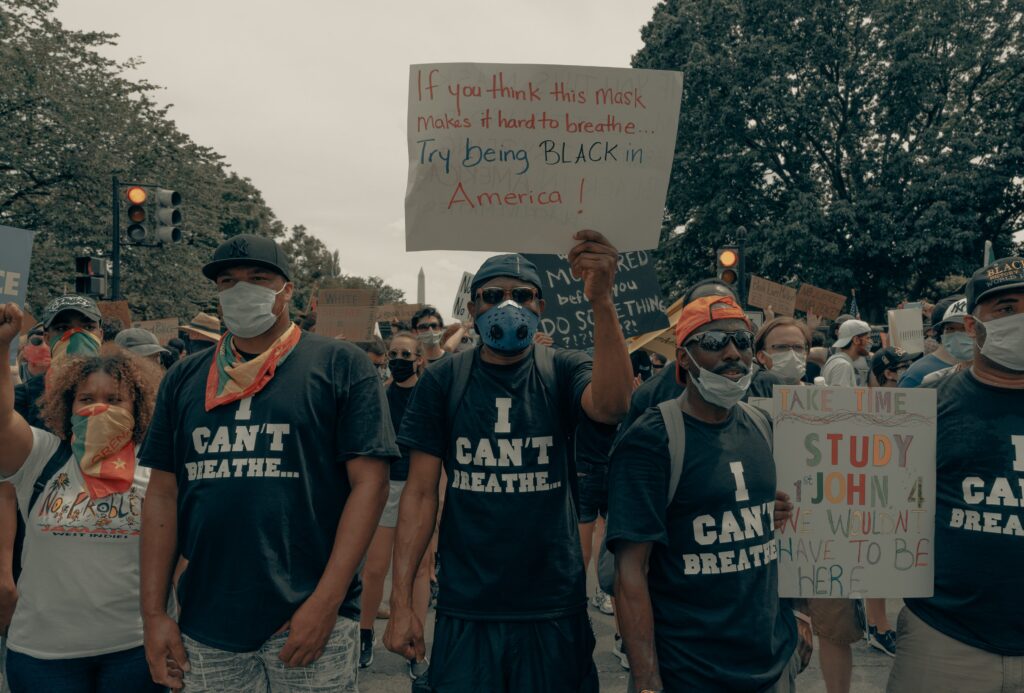
Psychological effects of racial profiling
Racial profiling can have significant psychological effects on individuals who are subjected to it. This type of policing, where race or ethnicity is used as a factor in making decisions about who to detain, arrest, or investigate, can cause significant stress, anxiety, and a sense of injustice. The psychological effects of racial profiling can be long-lasting and have far-reaching consequences on an individual’s mental health, well-being, and quality of life. The following is a highlight of the psychological effects of racial profiling:
- Psychological trauma: Racial profiling can cause psychological trauma, especially for those who have been repeatedly targeted by the police. The experience of being stopped, searched, or arrested based solely on one’s race can be traumatizing and leave individuals feeling violated, embarrassed, and humiliated. This trauma can be compounded by the fact that many individuals who are subjected to racial profiling are innocent and feel like they have been wrongly targeted.
- Anxiety and fear: Racial profiling can also cause anxiety and fear, especially for those who are stopped or searched by the police. This fear can be especially intense for individuals who have previously experienced racial profiling or have had negative experiences with law enforcement in the past. This anxiety and fear can impact an individual’s ability to participate in activities they enjoy and can limit their freedom and mobility.
- Loss of trust in law enforcement: Racial profiling can cause individuals to lose trust in law enforcement. This loss of trust can have far-reaching consequences for community-police relations and can make it more difficult for the police to do their job effectively. When individuals do not trust the police, they are less likely to cooperate with investigations, provide information, or report crimes, which can hinder the ability of law enforcement to serve and protect the community.
- Racial stigma and discrimination: Racial profiling can reinforce negative stereotypes about certain racial and ethnic groups and contribute to a sense of racial stigma and discrimination. This can cause individuals to feel marginalized and ostracized and can impact their self-esteem and self-worth. Racial profiling can also contribute to a cycle of racial discrimination and prejudice, where individuals who have been subjected to racial profiling are more likely to experience other forms of racial discrimination in their daily lives.
- Depression and anger: Racial profiling can cause depression and anger, especially for individuals who feel that they have been wrongly targeted by the police. The feeling of injustice can be especially pronounced for those who have been targeted multiple times or for those who have experienced other forms of discrimination and prejudice. This anger and depression can impact an individual’s mental health and well-being and can cause them to feel hopeless and powerless.

How does racial profiling affect the community?
Racial profiling is a widespread issue that affects not only individuals who are directly subjected to it, but also the broader society. Racial profiling refers to the practice of using race or ethnicity as a factor in making decisions about who to detain, arrest, or investigate. This type of policing is not only harmful to individuals who are targeted, but it also has far-reaching consequences for society as a whole. So how exactly does racial profiling affect society? Read on:
- Erosion of trust in law enforcement: Racial profiling can lead to a loss of trust in law enforcement, which can have serious consequences for community-police relations. When individuals feel that the police have unfairly targeted them, they are less likely to cooperate with law enforcement and less likely to report crimes. This can make it more difficult for the police to do their job effectively and can lead to increased crime in the community.
- Reinforcement of racial stereotypes: Racial profiling can reinforce negative stereotypes about certain racial and ethnic groups and contribute to a sense of racial stigma and discrimination. This can lead to further marginalization and ostracization of these groups and can make it more difficult for individuals from these groups to participate in the larger society.
- Economic consequences: Racial profiling can have significant economic consequences, both for individuals who are targeted and for the broader society. For individuals who are targeted, racial profiling can lead to missed work opportunities, loss of employment, and decreased income. For the broader society, racial profiling can lead to increased costs associated with law enforcement, criminal justice, and healthcare, as well as decreased productivity and economic growth.
- Political consequences: Racial profiling can have political consequences, as it can lead to increased frustration and anger among individuals who feel that they have been unfairly targeted by the police. This can contribute to social unrest and political instability and can make it more difficult for elected officials to govern effectively.
- Legal consequences: Racial profiling can have legal consequences, as it is a violation of an individual’s constitutional rights and can result in lawsuits and legal settlements. These legal consequences can be expensive for the government and can divert resources away from other important initiatives.
- Psychological consequences: Racial profiling can have significant psychological consequences for individuals who are targeted, including trauma, anxiety, fear, depression, and anger. These psychological effects have been discussed in detail in the above sub-heading (Psychological effects of racial profiling).
Need a custom racial profiling research paper? Cheap assignment helper is available for you 24/7
Factors encouraging racial profiling
Racial profiling is perpetuated by a number of different factors. The following are some of the key factors that contribute to the practice of racial profiling:
- Bias and prejudice: Bias and prejudice play a significant role in encouraging racial profiling. Police officers who hold negative beliefs and attitudes about certain racial and ethnic groups are more likely to engage in racial profiling. This type of bias can be unconscious or implicit, meaning that an individual may not even be aware that they hold these biases.
- Stereotyping: Stereotyping is another factor that contributes to racial profiling. When individuals rely on stereotypes to make decisions about who to detain, arrest, or investigate, they are more likely to engage in racial profiling. This type of policing is based on the belief that certain racial and ethnic groups are more likely to be involved in criminal activity.
- Racial profiling by other law enforcement agencies: Racial profiling by other law enforcement agencies can encourage the practice of racial profiling. When individuals see that racial profiling is being used by other law enforcement agencies, they may feel that it is acceptable and may begin to engage in this type of policing themselves.
- Pressure to produce results: Pressure to produce results can also contribute to racial profiling. When police officers are under pressure to solve crimes and make arrests, they may be more likely to engage in racial profiling as a means of achieving their goals.
- Lack of training and education: A lack of training and education can also contribute to racial profiling. When police officers are not provided with adequate training and education on the negative consequences of racial profiling, they may be more likely to engage in this type of policing.
- Inadequate accountability and oversight: Inadequate accountability and oversight can also contribute to racial profiling. When police officers are not held accountable for their actions, they may feel that they can engage in racial profiling without consequences.
- Racial tensions and conflicts: Racial tensions and conflicts can also contribute to racial profiling. When racial tensions are high, and there is a perception that certain racial and ethnic groups pose a threat to the community, individuals may be more likely to engage in racial profiling.
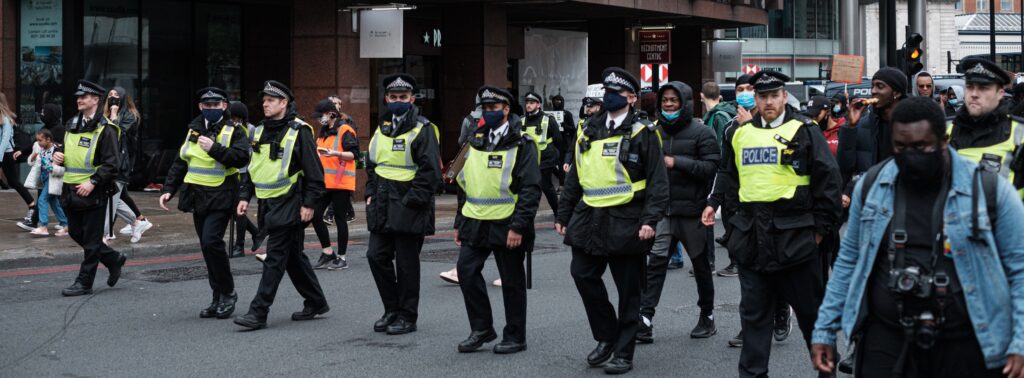
How to control and prevent racial profiling
Apart from being unethical and illegal, racial profiling is dangerous as it undermines public trust in the police and damages community relations. To effectively control and prevent racial profiling, a comprehensive approach is needed that involves education, policies and training, data collection and analysis, independent oversight, community involvement, media and public advocacy, and legal action.
- Education: Education and awareness are key to preventing racial profiling. The public, especially communities of color, should be informed about the negative effects of racial profiling and how to recognize it. This can be done through community outreach programs, public service announcements, and educational materials. It is also important to educate law enforcement personnel on the dangers of racial profiling and the importance of fair and impartial policing.
- Policies and training: Law enforcement agencies should implement policies that prohibit racial profiling and provide training to personnel on fair and impartial policing practices. The policies should clearly outline what constitutes racial profiling and the consequences for officers who engage in this behavior. The training should also cover cultural sensitivity and de-escalation techniques to prevent confrontations with members of the community.
- Data collection and analysis: Data collection and analysis are critical in monitoring and addressing racial profiling. Law enforcement agencies should collect data on stops, searches, and arrests and analyze it for patterns of racial profiling. The data should be made available to the public and used to identify areas for improvement. This information can also be used to provide evidence in court cases where racial profiling is being challenged.
- Independent oversight: Independent oversight is necessary to hold law enforcement accountable for racial profiling. This can be done through the creation of civilian review boards that are empowered to investigate complaints of racial profiling and hold officers accountable. The boards should have the authority to issue recommendations for change and provide information to the public about their findings.
- Community involvement: Community involvement is crucial in controlling and preventing racial profiling. Law enforcement agencies should engage with community organizations and individuals to build trust and develop relationships. This can be done through community meetings, town hall forums, and other events that allow for open dialogue and mutual understanding. Community members can also provide valuable feedback on policing practices and suggest reforms that will reduce racial profiling.
- Media and public advocacy: Media and public advocacy are powerful tools in raising awareness about racial profiling and promoting reforms. The media can highlight cases of racial profiling and provide a platform for the public to voice their concerns. Advocacy groups can also play a role in promoting change by advocating for policies that address racial profiling and raising public awareness about the issue.
- Legal action: Legal action is another avenue for addressing racial profiling. Individuals who have been subjected to racial profiling can file a complaint with law enforcement or take legal action in court. This provides a means of holding law enforcement accountable and seeking remedies for individuals who have been wrongly targeted.
Law enforcement agencies must take the lead in creating and implementing policies that prohibit racial profiling and provide training to personnel on fair and impartial policing. The community and advocacy groups also have a crucial role to play in raising awareness about racial profiling and advocating for reforms.
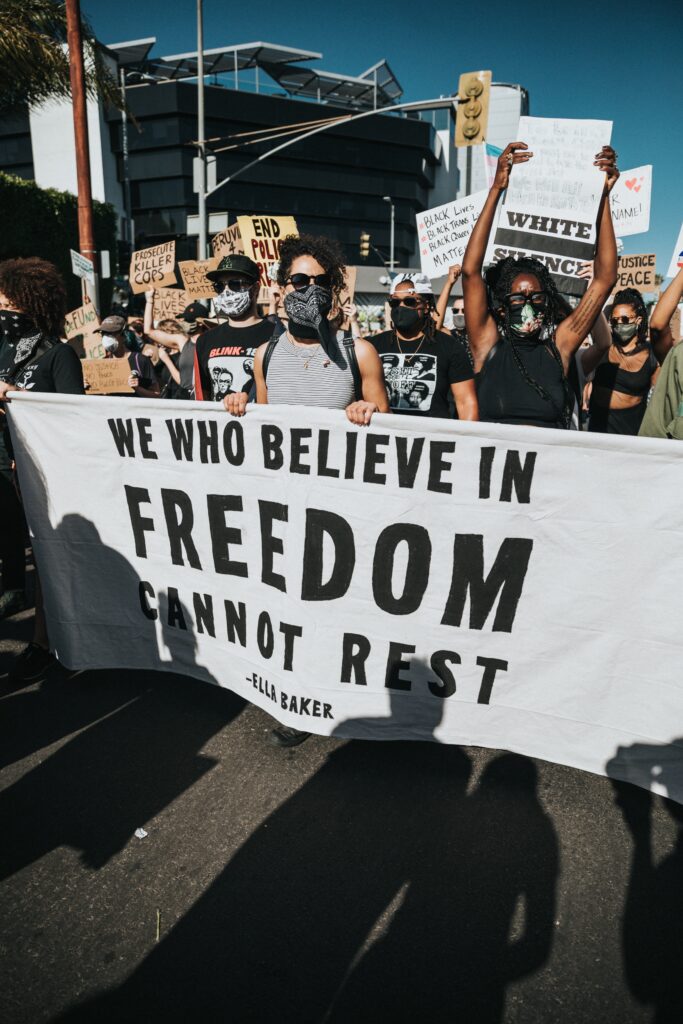
Conclusion
King Martin Luther King dreamed of a nation where black and white children co-existed, and they all could become anything they wished for. One would have believed that Luther’s dream had come true after the swearing-in of the first African-American president. But Luther’s vision is yet to be true wholly so long as minority communities are subjected to discrimination. Racial profiling is a hindrance to America becoming the nation the likes of Martin Luther wished for their forthcoming generations. The trauma, anxiety, fear, loss of trust, racial stigma, discrimination, depression, and anger that result from racial profiling can have far-reaching consequences for an individual’s mental health and well-being. To reduce the psychological effects of racial profiling, it is important to prevent this type of policing and provide support and resources to individuals who have been subjected to it. This includes providing education and awareness about racial profiling, implementing policies and training that prohibit racial profiling, and providing legal remedies for individuals who have been subjected to racial profiling. By working together, we can reduce the incidents of racial profiling and create a more just and equitable society for all.
Pingback: Essay about the American Dream -
Comments are closed.